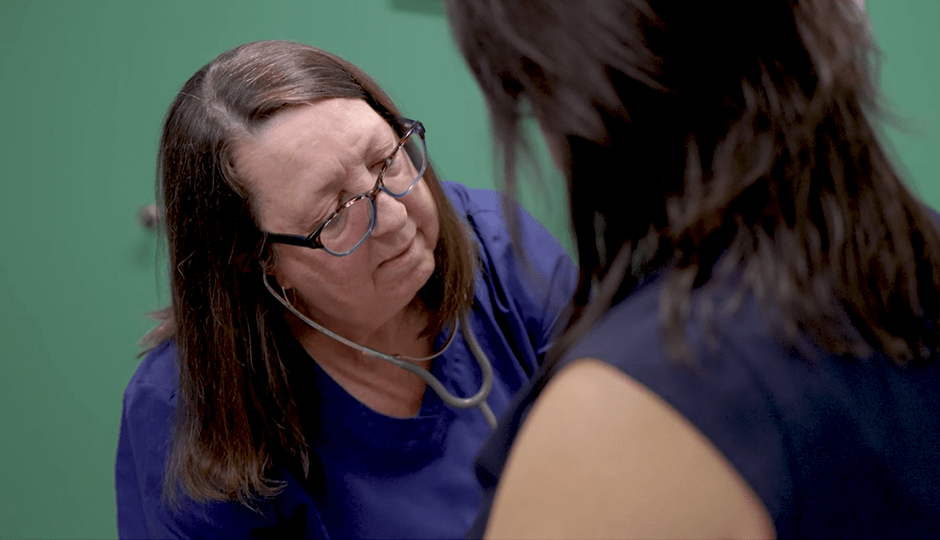Restorelle® M, L, XL, Y and Y Contour Polypropylene Mesh
Important Safety Information
Restorelle is a polypropylene mesh device intended to treat uterine or vaginal vault pelvic organ prolapse in women. Restorelle is surgically implanted through a small incision in the abdomen to act as a support to weak or damaged muscles of the uterus or vaginal vault (top of the vagina). Once implanted, the mesh is permanent and not intended to be removed.
Restorelle M, L, XL, Y and Y Contour is indicated for use as a bridging material for sacrocolposuspension/sacrocolpopexy (transabdominal placement via laparotomy, laparoscopic, or robotic approach) where surgical treatment for vaginal vault prolapse is warranted.
Restorelle M, L, XL, Y and Y Contour is not for females who have the following conditions:
- Pregnancy or desire for future pregnancy
- Potential for further growth (e.g., adolescents)
- Pre-existing local or systemic infection. Treat the infection with the appropriate antiseptics and/or antibiotics to eliminate the infection before placing the Restorelle M, L, XL, Y and Y Contour mesh
- Taking blood thinning medications (anticoagulant therapy)
- Any condition, including known or suspected pelvic pathology, which could compromise implant or implant placement
- Sensitivity/allergy to polypropylene
Check with your Physician on the warnings, precautions and risks associated with the use of this mesh. The effectiveness of Restorelle Y Contour has not been validated by a prospective, randomized clinical trial. A thorough assessment of each patient should be made to determine the suitability of a synthetic mesh procedure.
Check with your physician on:
- alternative prolapse treatments that may be appropriate
- the reason for choosing a surgical mesh procedure
- the postoperative risks and potential complications of transabdominal mesh surgery
- the mesh to be implanted is a permanent implant
- some complications associated with the implanted mesh may require additional surgery; repeat surgery may not resolve these complications
- serious adverse tissue responses or infection may require removal of the mesh and complete removal of the mesh may not always be possible
- individuals who have varying degrees of collagen laydown that may result in scarring
As with all surgical procedures, patients with certain underlying conditions may be more susceptible to postoperative bleeding, impaired blood supply, compromised/delayed healing, or other complications and adverse events.
The risks and benefits of using Restorelle M, L, XL, Y and Y Contour should be considered in patients with: • Age-related underlying conditions • Autoimmune disease • Coagulation disorder • Connective tissue disorder • Debilitated or immunocompromised state • Diabetes • Pelvic radiation therapy or chemotherapy • Physical characteristics (e.g., body mass index) • Smoking-related underlying conditions • Urinary tract anomalies.
Any future pregnancy could negate the benefits of this surgical procedure. Patients should report any bleeding, pain, abnormal vaginal discharge or sign of infection that occur at any time.
Adverse events are known to occur with transabdominal synthetic mesh procedures and implants. Adverse events following mesh implantation may be new onset (de novo), persistent, worsening, transient, or permanent.
Adverse events may include but are not limited to: • Abscess (acute or delayed) • Adhesion/scar formation • Allergy, hypersensitivity or other immune reaction • Bleeding, hemorrhage or hematoma • Bowel Related (Bowel obstruction, Constipation and/or defecatory dysfunction, Fecal incontinence and/or anal sphincter incompetence, temporary inability to pass food and waste through the intestine (ileus)) • Reopening of surgical incision (dehiscence) • Delayed wound healing • Extrusion, erosion or exposure of mesh into the vagina or other structures or organs • Formation of abnormal connection or passageway that forms between two structures in the body (fistula) • Infection • Inflammation (acute or chronic) • Local irritation • Mesh migration • Tissue death (necrosis) • Pain Related (new onset (de novo) and/or worsening painful intercourse (dyspareunia), Neuromuscular symptoms (acute or chronic), Pain (acute or chronic), Partner pain and/or discomfort during intercourse) • Perforation or injury of soft tissue (e.g., ligaments, muscles, nerves, vessels), structures, or organs (e.g., bowel, rectum, bladder, urethra, ureters, vagina) • Fluid buildup at site of surgery (seroma) • Suture erosion • Urinary Related (Bladder storage dysfunction (e.g., increased daytime frequency, urgency, nocturia, overactive bladder, urinary incontinence), Ureteral obstruction, Urinary tract infection, Voiding symptoms (e.g., painful urination (dysuria), urinary retention, incomplete emptying, straining, positional voiding, weak stream) • Vaginal Related (new onset (de novo) or worsening prolapse in untreated compartment, abnormal wound healing (granulation tissue formation), Palpable mesh (able to be felt by patient and/or partner), Recurrent prolapse, Sexual dysfunction, Vaginal discharge (abnormal), Vaginal scarring, tightening, rigidity, shortening and/or contracture.
The occurrence of adverse events may require one or more revision surgeries, including removal of the mesh. Complete removal of the mesh may not always be possible, and additional surgeries may not always fully correct the complications. There may be unresolved pain with or without mesh explantation.
This treatment is prescribed by your physician. Discuss the treatment options with your physician to understand the risks and benefits of the various options to determine if a transabdominal mesh procedure is right for you.
Caution: Federal law (USA) restricts this device to sale by or on the order of a physician.
PM-07280 / Feb 2024
Axis™ Tutoplast®
Important Safety Information
Axis™ Tutoplast® Processed Dermis is processed from donated human tissue. The US FDA regulates Axis Tutoplast Processed Dermis as a human cell and tissue product and restricts it to homologous use.
Homologous use means Axis Tutoplast Processed Dermis can be used by a qualified healthcare professional to repair, replace, reconstruct or supplement soft tissue. For your procedure this may include supplemental support and reinforcement of soft tissue, such as graft placement below the urethra (suburethral) in stress urinary incontinence
(SUI) procedures, and support and reinforcement of fascial structures (a type of connective tissue) in the pelvic floor in pelvic organ prolapse procedures. The implant is provided sterile.
WARNINGS
The same medical/surgical conditions or complications that apply to any surgical procedure may occur during or following implantation. Discuss the associated risks and potential complications of this procedure with your physician. As with any human tissue implant, the potential for transmission of infectious agents may exist. A small number of patients may experience localized immunological reactions to the implant. Successful treatment is dependent upon the patient’s host tissue response. In order for this procedure to be successful, Axis Tutoplast Processed Dermis will need to be integrated and remodeled with your own tissue.
PRECAUTIONS
Axis should only be used by a qualified physician familiar with the implant and the surgical procedure. Please let your doctor know if you are not feeling well since poor general health or any conditions such as limited blood supply, compromised healing, or an active infection should be considered before use.
Tutoplast is a registered trademark of Tutogen Medical GmbH.
PM-25857 05/2023







